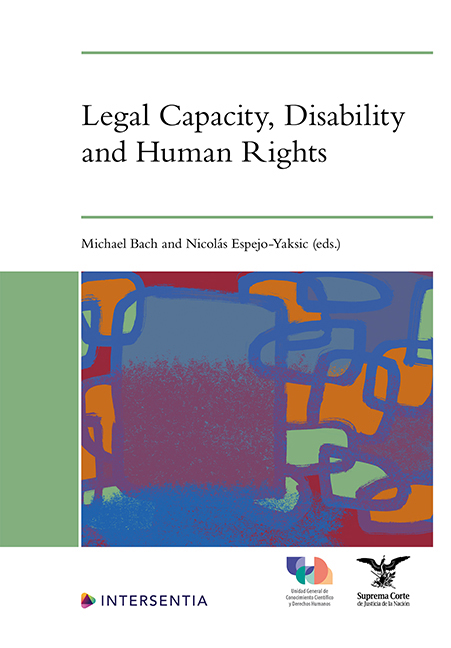Book contents
- Frontmatter
- Foreword
- Acknowledgements
- Contents
- List of Cases
- List of Contributors
- Legal Capacity, Disability and Human Rights: Introduction
- PART I HISTORICAL PERSPECTIVES AND THEORETICAL FRAMES
- PART II LAW REFORM: COUNTRY AND REGIONAL PERSPECTIVES
- PART III LEGAL QUESTIONS, PERSISTENT CHALLENGES
- Index
- About the Editors
A Critical Review of Legal Capacity Reforms in the African Region
Published online by Cambridge University Press: 03 April 2024
- Frontmatter
- Foreword
- Acknowledgements
- Contents
- List of Cases
- List of Contributors
- Legal Capacity, Disability and Human Rights: Introduction
- PART I HISTORICAL PERSPECTIVES AND THEORETICAL FRAMES
- PART II LAW REFORM: COUNTRY AND REGIONAL PERSPECTIVES
- PART III LEGAL QUESTIONS, PERSISTENT CHALLENGES
- Index
- About the Editors
Summary
INTRODUCTION
The majority of African countries have signed and ratified the CRPD and its Optional Protocol indicating a willingness to be bound by its norms and standards. Of the 54 African countries, 48 have ratified the CRPD and 49 have ratified the Optional Protocol to the CRPD. Article 12, which is regarded as “emblematic of the paradigm shiftof the Convention”, requires States Parties to “recognize that persons with disabilities enjoy legal capacity on an equal basis with others in all aspects of life.” Notably, the CRPD recognises “universal” legal capacity for all persons with disabilities, regardless of severity and requires States Parties to “take appropriate measures to provide access by persons with disabilities to the support they may require in exercising their legal capacity.” The African Charter on Human and Peoples’ Rights on the Rights of Persons with Disabilities in Africa (the “African Disability Protocol”) also requires the recognition of legal capacity and the provision of support to exercise legal capacity.
In spite of having ratified the CRPD, many governments, including African governments, remain opposed to the idea of “universal” legal capacity for all persons with disabilities. Nonetheless, there have been sporadic legal capacity reform efforts aimed at closing this chasm by aligning domestic legislation with the CRPD. Kenya, Zambia and Southhave all taken steps to reform domestic law on legal capacity with varying levels of success. Reform efforts in these countries have taken place through the courts and through the legislature.
After ratifying the CRPD on 5 May 2008, Kenya has two bills currently before Parliament, namely the Persons with Disabilities (Amendment) Bill 2015 and the Mental health (Amendment) Bill 2018, boThof which seek to domesticate the CRPD. Zambia ratified the CRPD on 2 February 2010, and two years later, enacted the Persons with Disabilities Act 2012, which domesticates the CRPD. In 2019, Zambia also enacted the Mental health Act to which the right to legal capacity is directly relevant. Southratified the CRPD on 30 November 2007 and is instituting legal capacity reform through the Supported Decision-Making Bill.
- Type
- Chapter
- Information
- Legal Capacity, Disability and Human Rights , pp. 177 - 198Publisher: IntersentiaPrint publication year: 2023



